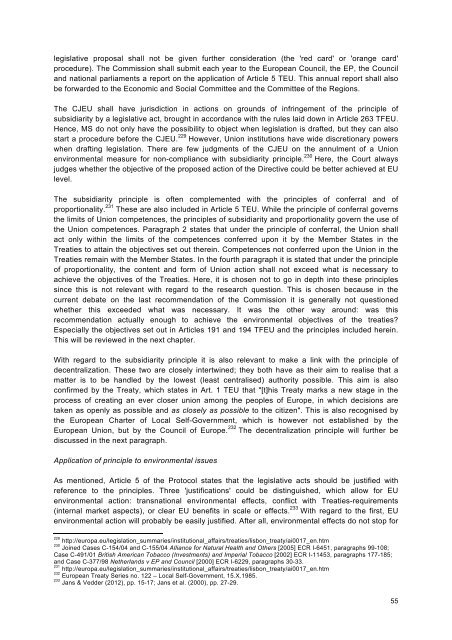Thesis-Anne-Vos-Masters-SBR-and-EU-Law-3
Thesis-Anne-Vos-Masters-SBR-and-EU-Law-3
Thesis-Anne-Vos-Masters-SBR-and-EU-Law-3
You also want an ePaper? Increase the reach of your titles
YUMPU automatically turns print PDFs into web optimized ePapers that Google loves.
legislative proposal shall not be given further consideration (the 'red card' or 'orange card'<br />
procedure). The Commission shall submit each year to the European Council, the EP, the Council<br />
<strong>and</strong> national parliaments a report on the application of Article 5 T<strong>EU</strong>. This annual report shall also<br />
be forwarded to the Economic <strong>and</strong> Social Committee <strong>and</strong> the Committee of the Regions.<br />
The CJ<strong>EU</strong> shall have jurisdiction in actions on grounds of infringement of the principle of<br />
subsidiarity by a legislative act, brought in accordance with the rules laid down in Article 263 TF<strong>EU</strong>.<br />
Hence, MS do not only have the possibility to object when legislation is drafted, but they can also<br />
start a procedure before the CJ<strong>EU</strong>. 229 However, Union institutions have wide discretionary powers<br />
when drafting legislation. There are few judgments of the CJ<strong>EU</strong> on the annulment of a Union<br />
environmental measure for non-compliance with subsidiarity principle. 230 Here, the Court always<br />
judges whether the objective of the proposed action of the Directive could be better achieved at <strong>EU</strong><br />
level.<br />
The subsidiarity principle is often complemented with the principles of conferral <strong>and</strong> of<br />
proportionality. 231 These are also included in Article 5 T<strong>EU</strong>. While the principle of conferral governs<br />
the limits of Union competences, the principles of subsidiarity <strong>and</strong> proportionality govern the use of<br />
the Union competences. Paragraph 2 states that under the principle of conferral, the Union shall<br />
act only within the limits of the competences conferred upon it by the Member States in the<br />
Treaties to attain the objectives set out therein. Competences not conferred upon the Union in the<br />
Treaties remain with the Member States. In the fourth paragraph it is stated that under the principle<br />
of proportionality, the content <strong>and</strong> form of Union action shall not exceed what is necessary to<br />
achieve the objectives of the Treaties. Here, it is chosen not to go in depth into these principles<br />
since this is not relevant with regard to the research question. This is chosen because in the<br />
current debate on the last recommendation of the Commission it is generally not questioned<br />
whether this exceeded what was necessary. It was the other way around: was this<br />
recommendation actually enough to achieve the environmental objectives of the treaties?<br />
Especially the objectives set out in Articles 191 <strong>and</strong> 194 TF<strong>EU</strong> <strong>and</strong> the principles included herein.<br />
This will be reviewed in the next chapter.<br />
With regard to the subsidiarity principle it is also relevant to make a link with the principle of<br />
decentralization. These two are closely intertwined; they both have as their aim to realise that a<br />
matter is to be h<strong>and</strong>led by the lowest (least centralised) authority possible. This aim is also<br />
confirmed by the Treaty, which states in Art. 1 T<strong>EU</strong> that "[t]his Treaty marks a new stage in the<br />
process of creating an ever closer union among the peoples of Europe, in which decisions are<br />
taken as openly as possible <strong>and</strong> as closely as possible to the citizen". This is also recognised by<br />
the European Charter of Local Self-Government, which is however not established by the<br />
European Union, but by the Council of Europe. 232 The decentralization principle will further be<br />
discussed in the next paragraph.<br />
Application of principle to environmental issues<br />
As mentioned, Article 5 of the Protocol states that the legislative acts should be justified with<br />
reference to the principles. Three 'justifications' could be distinguished, which allow for <strong>EU</strong><br />
environmental action: transnational environmental effects, conflict with Treaties-requirements<br />
(internal market aspects), or clear <strong>EU</strong> benefits in scale or effects. 233 With regard to the first, <strong>EU</strong><br />
environmental action will probably be easily justified. After all, environmental effects do not stop for<br />
229<br />
http://europa.eu/legislation_summaries/institutional_affairs/treaties/lisbon_treaty/ai0017_en.htm<br />
230<br />
Joined Cases C-154/04 <strong>and</strong> C-155/04 Alliance for Natural Health <strong>and</strong> Others [2005] ECR I-6451, paragraphs 99-108;<br />
Case C-491/01 British American Tobacco (Investments) <strong>and</strong> Imperial Tobacco [2002] ECR I-11453, paragraphs 177-185;<br />
<strong>and</strong> Case C-377/98 Netherl<strong>and</strong>s v EP <strong>and</strong> Council [2000] ECR I-6229, paragraphs 30-33.<br />
231<br />
http://europa.eu/legislation_summaries/institutional_affairs/treaties/lisbon_treaty/ai0017_en.htm<br />
232<br />
European Treaty Series no. 122 – Local Self-Government, 15.X.1985.<br />
233<br />
Jans & Vedder (2012), pp. 15-17; Jans et al. (2000), pp. 27-29.<br />
55



